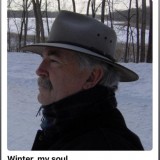Weekly Contest Winners - May 7, 2018!
-
PnQ Mod Account
6 years ago, updated 6 years agoHappy Monday to you all! I am seriously blown away (but not surprised) by the prompt comments from our judges and their dedication already for this new term. I want to thank them for their time and hard work, especially on this first weekend of the new term. Huge congratulations to our three clear winners! William Mae, with an inspirational poem about newfound meaning once a woman (or women as a whole) entered this world. Then we have the exciting collaboration of a sonnet written by both Ben Pickard and Kitty Cat Lady. And last but by no means least, Purvi Gadia graces us with a poem filled with song, lament and awaiting love. Beautiful work everyone, and congrats to all the HM'S highlighted as well. Have a wonderful week :)
~ MaryAnne
_____________________________
WINNERS
"When Angels Sighed"
by: William Mae 10 + 10 = 20 points
"A Love That Fills The Universe" by: Ben Pickard and Kitty Cat Lady 10 + 7 = 17 points
"a song from paradise"
by: purvi gadia 10 + 7 = 17 points
_________________________________
COMMENTS:
"When Angels Sighed" by: William Mae
"In my 50 years of age, I have seen almost every role a woman played to protect or to nurture our society. I have seen care in my mother's eyes, love in the craziness of my sisters, trust in every word spoken by my wife and I shared all my worries with my female friends and they always listened to me very patiently and provided me solutions to bring smile on my face once again. So, yep, a big yes to what you wrote in the last stanza. There could be a little improvement in the first stanza rhyming part with clock and forgot. Rest, it is indeed a complete poem for me, just like a woman.
And I want to mention a quote by William golding
'I think women are foolish to pretend they are equal to men. They are far superior and always have been. Whatever you give a woman, she will make greater. If you give her sperm, she will give you a baby. If you give her a house, she will give you a home. If you give her groceries, she will give you a meal. If you give her a smile, she will give you her heart. She multiplies and enlarges what is given to her. So, if you give her any crap, be ready to receive a ton of sh*t." (10)
- - - - - - - - - - - - - - - - - -
"Taken from darkness to a place where angels quite literally sigh, this piece (for me at least) stole the show. With great alliteration to creation, or intelligent design, the author/subject finds higher purpose upon meeting the woman he feels was created for him: his other half who to him was beautiful enough for even the angels to take notice. William demonstrates a poetic ear with his firm grasp of rhythm and rhyme. There are a few instances of wonderful personification that breathe life into the poem as well, and overall I felt this was most deserving of my 10." (10)
_________________________________
"A Love That Fills The Universe" by: Ben Pickard and Kitty Cat Lady
"This collaboration is a marvellous. Not only have both authors overcome the challenge of writing collaboratively, but they have chosen, one of the most challenging forms, an English Sonnet.
When I think of a Sonnet, I immediately think of all subjects, 'Love'. I imagine the writer to use symbolisms of love, such as, pyrotechnics and natural phenomenon to paint a show of joy and happiness.
We have a magical, cosmic spectacle of colliding stars. Showing me the harmony of shining stars 'hearts', no less. I can picture the scene: On a back drop of crisp darkness, two stars synchronise in perfectly. In an instant, the night sky is transformed, sending cascading showers of wonder throughout the universe. Ok, ok, I need to take a moment to breathe here. Wow!
There is so much contained in the first quatrain that this could be a stand-alone poem.
In the second verse, hearts fuse together (ooh, err, matron) they go travelling. First the world (Earth) then, not content with an 'around the world trip' they get their paint sets out and set to work in broad strokes. They paint a wonderful image, a splendid, vivid rainbow between Earth and Mars. Can you imagine that!? Now, not content with this solar system, the cosmic energy is such that this solar system cannot contain it. It spreads out beyond our milky way galaxy and to others afar.
I really do not know how much more I can take?
In this last quatrain we are looking for the above imagery/ concepts to take shape. We want to have a clearer understanding of the poets' intent:
Two people who love deeply, making it all powerful. Their joy is this is incredible enough for to sing (duet), a serenade, sharing their love with any and all. Once sung, their love is gifted wings for it to be ethereal, to travel, far and wide, sharing their eternal message.
What if this poem had a conclusion - you know, a place where all the above was summarised? Fortunately, there is, in a rhyming couplet.
I will not comment on this; instead I will quote it here, for all the clarity is within:
"The sky alone can't hold a love so true
It fills a timeless space our hearts outgrew."
Both authors have come together (just don't) and written a love sonnet that not only sounds great with undulating meter throughout. It also, contains all the other necessary requirements, like: setting a theme, being puzzled in the 1st verse. I want this be elaborated in the 2nd. Then by the 3rd, if I haven't realised the poems intent, something is wrong. The final couplet should be the failsafe. If a sonnet makes no sense in the couplet, screw it up and fling it away.
This whole poem showed me how good a sonnet can be. It works and it is good. It is worthy, not only of my ten points, but to go down in history!" (10)
- - - - - - - - - - - - - - - - - - - -
"Nothing in this could be more harmonious than reading a beautiful poem about love that is eternal and infinite. You have no idea how much this sonnet collaboration did by two of you has grown inside my heart within just one week. The two of you have shown us the entire universe is filled with love and only love. Syllable counts spot on for sure.
I wanted to give this poem full ten points but there are two places where rhyme scheme didn't work properly(sing and wings or Mars and afar). One more thing I could be wrong on this but you guys should check the musical flow in this line 'And by the moon and by the heavens' lights'. If you guys believe in honest comment you won't mind it at all..:)" (7)
_______________________________
"a song from paradise" by: Purvi Gadia
"I read it and I felt or found myself in a very pleasant and beautiful state or place. Right from the very beginning till the end. The visuals you created along with the tale of a bird who comes from paradise and sings to you and in that moment you forget all your worries for a while. I don't know why you desire to listen to its songs when the whole world is waiting ahead for you to read your words to them and to listen from you because they are as beautiful as that bird from the paradise." (10)
- - - - - - - - - - - - - - - - - -
"I have seen your poetic journey in pnq started from 'oh my, oh my ' to 'intoxication of forbidden dreams'. I have seen ups and downs in that journey. However the poems you are writing from last few weeks they are the best, just the ups. This poem is just one of them. You are writing and improving at the same time. Most of the times, people just write random things they have no idea what a poem should be like. You know this very well. Even if you write a tale you keep the length short, I guess this is when we speak of poetry. You definitely write while sitting in the garden of eden and this is one of the flower, the fragrance of which is going to last in my heart forever. The only thing you need to work, just a tiny bit, is the punctuation." (7)
_______________________________
-
PnQ Mod Account
6 years ago, updated 6 years agoHM’S:
“Found” by: Ben = 10 points
“Between you and me” by: Em = 7 points
“In Too Deep” by: CJ Maleney = 7 points
“Strawberry love” by: Mr Darcy = 7 points
“Amber Birches” by: Mark = 4 points
“a few words in april (haiku)” by: Mr. Darcy = 4 points
“Battle Standard” by: Tony = 4 points
“Life” by: Mark Rawlins = 4 points
“Lingering confession” by: brise = 4 points
_______________________
COMMENTS:
“Found” by: Ben
“There was a lot said last term about poems simply resonating with a judge; that there can be little else to help them make their decision - technical brilliance, form, rhyming, imagery etc often being largely irrelevant. Well, it is with a poem like this, and now as a judge, that I feel the full weight of that. This resonated with me like few poems have - in fact, it did so four or five times! One man's journey from a bleak, metaphor-filled hopelessness, where he cannot recognise even himself anymore, to a calmness and serenity that can only be found under 'burning suns and frozen seas' and between 'branches of old sycamores'. Nature heals, as is told throughout this marvellous piece, but it also inspires, as is evidenced by the poem's very existence.
In terms of suggestions, only that 'and yet still, I am here' then 'As I lay here' sounded a little repetitive to my ear - what about just dropping the second 'here' and making that line 'as I lie staring up...'. Not sure. Anyway, I am honoured to be able to award it my first '10' of the new judging term as I believe free verse doesn't come much finer than this.” (10)
___________________________
“Between you and me” by: Em
“A person may read this and quickly dismiss it. They may think, it an immature write. They would be wrong. The wonder with these short forms is they often speak on different levels. The title suggests a relationship. In this case one of secrecy. The author is urging us to listen: psst, I have something to tell you in hushed tones. So, straight away I am, all ears:
This 5/7/5 form suits the senryu form, that being about human nature/ foibles. They often speak about dark and/or cynical themes.
The first two lines set, successfully I might add, a happy scene - this is important for this form, if there is to be an, all important, cause and effect element. The third line should make an impact. Those of us that know Em, know she works as a dinner lady. She paints the scene: One of 'nice' children talking/laughing/playing whilst having lunch. But, hey, didn't she use the word 'quicker'? This poses a subconscious question. Why would this be a positive thing?
Then comes the turn, a juxtapose positioning of children and clowns and day and night. It is an eerie and works well.
The appearance of clowns is genius. We have all seen clowns at the circus, families laughing as they chase each other with buckets full of water and custard pies. But, there is the sinister side too. Clowns induce fear into children and adults alike; just read, Stephen King's IT if you are not convinced. I think it is the strange face paint, depicting, the ever-present smile that freaks a person out.
I read this into the poems intent: Why would a person stay at home, hour after long hour if that meant facing their demons? Like Em, they would choose to keep themselves busy, keep that haunted mind occupied with positive images, like school children.” (7)
__________________________
“In Too Deep” by: CJ Maleney
“A dark, descriptive, and deeply relatable series of quatrains drew me "in too deep" to CJ Maleney's nightmares this week. I don't know if it was the relatability or the artfully engaging rhymes that kept me coming back to this poem, but something about it made me change my votes this morning that I had already decided on last night.” (7)
______________________
“Strawberry love” by: Mr Darcy
“I suppose what I find intriguing about this piece is what its real and unadulterated meaning may actually be. Yes, absolutely, it could simply be about biting into a sweet and juicy strawberry, savouring its taste long after it has been consumed...or perhaps it is about something different altogether. I feel, as far as my heightened position as a judge goes, I must leave it there and trust to the reader's own imagination. However, it is wonderfully laid out, full of craft and imagination - as is typical of this writer - and, in all, a very delectable sort of write that I enjoyed thoroughly.” (7)
_________________________
“Amber Birches” by: Mark
“I am not ashamed to say that I struggled with this poem; I really had to dissect and read it a few times to truly appreciate it. There is a timelessness to it that brings the reader to an almost Victorian era Whether it was the way the rhymes force the reader to pronounce words in an older fashion to get the full effect of the rhythm, the diction, or the beautiful imagery that accomplished the peculiar effect is lost on me. I think everyone who reads this beautiful piece will walk away with a different meaning and that, in my humble opinion, is half of its charm.” (4)
______________________________
“a few words in april (haiku)” by: Mr. Darcy
“This poem has its own hidden beauty. I see people write too much and not be able to portray the emotions very well, yet you delivered so much in just three lines. It touched my heart in zillion ways. Haiku has two fragments. I think you should have put a comma after the rain, plus it should have been started with a uppercase letter and there should be a period in the end.” (4)
__________________________
“Battle Standard” by: Tony
My sleeve is where my heart is worn,
Barely beating and battle-torn.
^^
“It's not least because of this fact that I am so fond of Tony's work. He is capable of so many different styles, undoubtedly, but it's these no frills, 'heart on sleeve' sorts of writes that always leave me cold and he seems to turn them out at will. They hit you like a kick to the guts, especially considering he writes from genuine experience in terms of being a soldier and has obviously suffered a good deal. Well done, Tony.” (4)
________________________
“Life” by: Mark Rawlins
“I liked this wry look on life. The poem sets out nicely down the page, in a series of challenging, rhyming quatrains, that, for the most part, flow really well. It is a shame, however, that substance was used over form. Maybe this was the authors intent? Showing us that sometimes we need to rebel from societal structures, in this case poetry structure. If this was the case, a footnote would have helped.
It is clear that using the metaphor of a crap sandwich was all important. I like it, on the surface the sandwich looks great, that is, until you taste it. Adding more bread will make it more palatable, enabling you to get through it/life. This verse and the final one stumble and consequently detract from what is otherwise a great flowing poem.
In life we have many decisions to make. Choices like, eating chocolate, or wholemeal pasta. If we make too many frivolous ones, we may be happy, but at what cost? Conversely, if we deny ourselves the pleasures in life, we suffer too! What is a person to do? Mark wants us to live for today, tomorrow may never come. I know it sounds cliché, but life often is.” (4)
_________________________
“Lingering confession” by: brise
"Well I am here on this site for few years now and what I observed is that most of us write about a particular emotion or what we can relate to or what is happening in our life at the moment. Brise mostly writes about secret love affairs in a sensual way and there is no wrong in expressing such emotions. There are such moments come when we desire our lover to have every bit of us or to please us with every inch of them. Each one of us has our hold over a particular style or format. Brise expresses her emotions towards sensual love with rhyme. I didn't find any flaws in the poem but the first two lines of the last stanza interrupts the flow of the poem for a inch. Did I just say inch? I am really talking in her language now." (4)
-
Ben Pickard
6 years agoAmazing comments, amazing poems, so a huge congratulations all round this week.
Thanks to the judge for pointing out a couple of issues which I have to be honest, are all on me! Though I do believe half rhymes are more than acceptable in sonnets and as far as the meter in that line goes, I'm pretty sure it's spot on but I do genuinely appreciate your honesty and will take another look.
Kitty - thank you for working with me and thanks to all involved.
Ben -
Lost One replied to Ben Pickard
6 years agoAgreed, I'm very fond of "half rhymes" and "almost rhymes," they open up so many possibilities. When they are artfully done you almost don't even notice them.
-
naaz
6 years ago, updated 6 years agoCongratulations to our front page winners, the HM's and the nominated ones.
Thanks to judges and moderators for all their support and love towards all of us.
Thanks to maryanne for hosting the contest this week.
Let's cheer up together for William, kitty cat lady and purvi on their perfect win.
Love you all! -
-
Kitty Cat Lady
6 years ago, updated 6 years agoOh wow! I can't tell you how thrilled I am to have won a weekly with Ben and to share the front page with William and Purvi. Congratulations to all winners, HMs and nominations.
Thanks so very much to Ben for collaborating with me (it really was fun!) and to the judges for their hilarious and constructive comments. Thanks to Mr Darcy for nominating it and to Michael and Scott for my other nominations.
Well done to the new judges for their time and scrutiny of so many great poems this week.
=^.^= -
CJ Maleney replied to Ben Pickard
6 years agoSo chuffed you guys got a win with this.
You both know me and I think you kinda get the fact that I can't work within constraints.
That you got such accolade for perhaps being slightly off kilter makes me smile.
And as to your collaboration. Well! You both know I loved it.
Tips ones hat to the judge that looked a little deeper.
Craig -
Ben replied to PnQ Mod Account
6 years agoWonderful poems to grace the comp this week, I just wanted to thank judges for their time and for the honestly quite humbling comment on my own write who hit the nail right on the head!
Congrats winners and HM's alike!!
-
CJ Maleney
6 years agoMassive well done to all winners and those who received H.M's. Fantastic efforts all round.
Big thank you to the judge who commented and voted for mine and a massive thanks to Mr Darcy for nominating it.
Regards
Craig -
Em (marmite)
6 years agoWell done to the new judges on their first week especially with prompt and fantastic comments and thank you.
Thanks to Maryanne for hosting.
A big congratulations to the well deserving front pagers and to all my fellow HMers (lol)
A big thank you to the judge for their fantastic comment on my piece I cannot wait for you to be revealed ofcourse if you do at the end of term :)
Can't wait for the upcoming week.. Stay fabulous everyone -
Larry Chamberlin
6 years ago, updated 6 years agoWilliam, Kitty, Ben and Purvi: congratulation!
Excellent works. Congrats to the HMs as well. Thanks, MA for hosting. Thanks to the new judges for their diligence.












